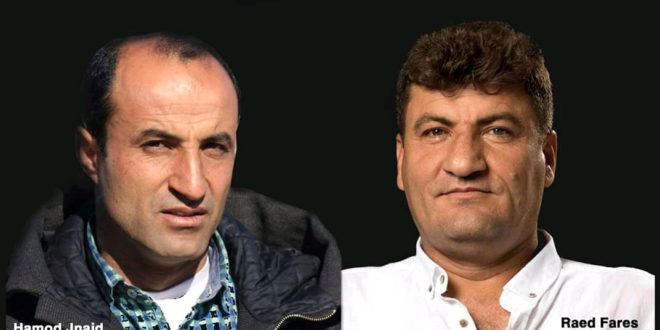Beirut, November 26, 2018–The Committee to Protect Journalists today condemned the assassination of prominent radio host Raed Fares and photographer Hamoud al-Jnaid and urged local authorities in the northwestern Syrian city of Kafranbel to investigate the murder and bring those responsible to justice.
Unknown gunmen killed Fares, founder and director of the independent radio station Radio Fresh and the Kafranbel Media Center, and al-Jnaid, a reporter and photographer for Radio Fresh, as the journalists were on their way to cover a protest in Kafranbel on November 23, according to news reports, the Syrian Journalists Association, the journalists’ employer, and the regional press freedom group Skeyes Center for Media and Cultural Freedom.
“Even as the international spotlight on the Syrian conflict continues to dim, journalists like Raed Fares and Hamoud al-Jnaid continue working, at the gravest possible risk, to inform the global public of the violence and turmoil in their homeland,” said CPJ Middle East and North Africa Program Coordinator Sherif Mansour from Washington, D.C. “We condemn their murder and call on all sides to the conflict to do their utmost to allow journalists to report safely and without fear of retaliation.”
Ali Dandoush, a journalist and photographer for Radio Fresh who was in the car with Fares and al-Jnaid when they were gunned down, told CPJ that they had left the radio station in eastern Kafranbel and, after driving 100 meters, they passed a silver van with tinted windows.
“The van followed us and when we were near the house of a relative of Fares, the van came closer and stopped about two meters to our left. The gunmen subsequently opened fire with their machine guns at us. Three of them got out and shot us again when Fares and al-Jnaid were trying to get out of the car and then they left. I was sitting in the back seat of the car and miraculously wasn’t injured, but I saw three attackers. Their faces were not covered, but I didn’t know them. Al-Jnaid died immediately of his injuries and Fares was rushed to the Kafranbel hospital where he died of his injuries shortly afterward. Over the past two months we have been receiving threats at our office from armed groups, including the Al-Nusra Front,” Dandoush told CPJ.
Fares, an activist as well as a journalist who founded Radio Fresh in 2013 and was also the director of the Union of Revolutionary Bureaus–an umbrella group of civil society organizations in Kafranbel–had previously survived an assassination attempt by men who Fares identified as Islamic State gunmen in January 2014, according to a New York Times report. He was known for his witty protest banners and for creatively defying armed demands from Islamist factions, including the Al-Qaeda-linked Al-Nusra Front (currently known as Hayat Tahrir al-Sham), that Radio Fresh stop playing music on air or get rid of female news readers by playing animal sounds or distorting the voices of female news readers to make them sound like robots, according to news reports.
In his last Facebook post–dated October 5, 2018–Fares posted a video of a demonstrations in Kafranbel calling for the downfall of the regime and wrote, “The people of Kafranbel are in Freedom Square and voices are chanting: ‘The people want the downfall of the regime.’ We started this in 2011 and we carry on. Our loyalty to the martyrs and detainees has increased our determination.”
Al-Jnaid, a media activist who had been working for Radio Fresh as a photographer and reporter since its inception in 2013, covered the demonstrations against the Bashar al-Assad regime and the airstrikes and bombings by al-Assad-aligned forces on Kafranbel, according to the Syrian Journalists Association and his employer.
Syria is one of the most dangerous places in the world for journalists. At the time of CPJ’s most recent prison census, at least seven journalists were in Syrian state prisons; many others are missing. At least 124 journalists have been killed covering the Syrian conflict, according to CPJ research.
